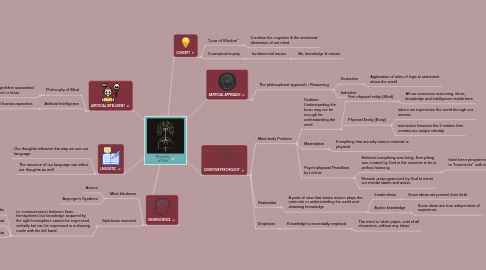
1. NEUROSCIENCE
1.1. Mind-blindness
1.1.1. Autism
1.1.2. Asperger's Syndrom
1.2. Split-brain research
1.2.1. no communication between brain hemispheres but knowledge acquired by the right hemisphere cannot be expressed verbally but can be expressed in a drawing made with the left hand.
1.2.1.1. Phantom Limbs
1.2.1.2. Aynesthesia
1.2.1.3. Severe Amnesia
2. LINGUISTIC
2.1. Our thoughts influence the way we use our language .
2.2. The structure of our language can affect our thoughts as well
3. ARTIFICIAL INTELLIGENT
3.1. Philosophy of Mind
3.1.1. Concerned about the problem associated with the function of mind or brain
3.2. Artificial Intelligence
3.2.1. Attempt to model human capacities
4. CONCEPT
4.1. "Love of Wisdom"
4.1.1. Combine the cognitive & the emotional dimension of our mind
4.2. Conceptual inquiry
4.2.1. fundamental issues
4.2.1.1. life, knowledge & values.
5. ARTIFICIAL APPROACH
5.1. The philosophical approach : Reasoning
5.1.1. Deductive
5.1.1.1. Application of rules of logic to statement about the world
5.1.2. Inductive
6. COGNITIVE PSYCHOLOGY
6.1. Mind-body Problem
6.1.1. Dualism : Understanding the brain may not be enough for understanding the mind
6.1.1.1. Non-physical entity (Mind)
6.1.1.1.1. All our conscious reasoning, ideas, knowledge and intelligence reside here
6.1.1.2. Physical Entity (Body)
6.1.1.2.1. where we experience the world through our senses
6.1.1.2.2. interaction between the 2 entities that creates our unique identity
6.1.2. Materialism
6.1.2.1. Everything that actually exist is material or physical
6.1.3. Psychophysical Parrallism by Leibniz
6.1.3.1. Believed everything was living; Everything was created by God in the universe to be in perfect harmony.
6.1.3.1.1. have been programmed by God in advance to "harmonise" with each other
6.1.3.2. Monads preprogrammed by God to mirror our mental states and action
6.2. Rationalist
6.2.1. A point of view that states reason plays the main role in understanding the world and obtaining knowledge
6.2.1.1. Innate ideas
6.2.1.1.1. Some ideas are present from birth
6.2.1.2. A prior knowledge
6.2.1.2.1. Some ideas are true independent of experience
6.3. Empiricist
6.3.1. Knowledge is essentially empirical
6.3.1.1. The mind is 'white paper, void of all characters, without any ideas'
